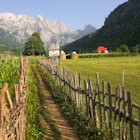
Jun 13, 2022 тЂ 3 min read

Sep 25, 2023 тЂ 4 min read

Adventurous cyclists can start planning their trip along the 1250-mile Trans Dinarica trail through the Western Balkans ТЉ MatevХО Hribar
In 2024, cyclists can look forward to pedaling along a new 2000km (1242-mile) route linking eight Balkan countries.
The will take riders across a region of extraordinary natural diversity, from the lush forests of Slovenia to the rugged mountains of Montenegro and North Macedonia, past crystal-clear rivers in Bosnia and Hercegovina and Serbia, along the stunning coastlines of Croatia and Albania, and through the national parks of Kosovo. With each country offering its own distinct flavor and charm, the Trans Dinarica truly offers the full package for cyclist-travelers in search of an unforgettable adventure.
According to Alex Crevar from , one of the trailтs organizers and advocates, once the route is complete, тdetailed navigation information will be available for people to plan every stage with services, cultural stops, Unesco sites, national parks, accommodation, restaurants, prime places to stop for sightsт and more. This will be the first resource of its kind for cyclists wishing to discover the Western Balkans.

The team behind the Trans Dinarica hopes to create a route that brings together adventure travel and culture. тThe route purposely doesnтt stop in all the big cities.т Crevar says. тThe idea is to spread sustainable tourism throughout the region.т With many regional capitals and urban hubs already within reach, rural and overlooked communities are set to benefit the most from the trail. тSustainable tourism means making sure all communities benefit in a healthy way,т Crevar adds.
The creation of the Trans Dinarica is more than just issuing a map: itтs a full-service route-development project. This encompasses everything from creating GPS data sets to meeting local guest house owners to connecting with local cycling guides who know the state of the roads. The team is also preparing for an eventual set of signs to mark the trail and enable cellphone-less navigation.
Cyclists should bring some patience along with their gear, for there will be inevitable hiccups in the early years of coordinating such a long route across so many countries. Planning to ride it in 2024? Expect an adventurous experience т and definitely plan on providing feedback to the folks at GoodTrail, who are eager to refine and improve.

Donтt come to the Trans Dinarica if youтre looking for all-asphalt roads; you can expect some rough pavement and dirt routes along the way. Do come if youтre ready for adventure, have big wheels on your bike and are ready to engage with the locals. Tobi Gessler, founder and guide at , reports that in recent years тnew asphalt roads have been built, including in mountain areas. Until now many of these have not had much car traffic т so they can be a joy to cycle. But in general, roads т including new roads т in Albania are not designed for cyclists but instead with cars in mind.т
An upside to dirt roads? They usually bring cyclists to unsaturated destinations. Gessler believes the trail can help with the тdecentralization of tourismт in Albania, a country with plenty of natural beauty to go around.

Completing the trail in one shot is unlikely for most cyclists, since itтs made up of winding circuits in each country. This makes it great for planning a seven-day loop through Croatia and Montenegro, say, or a five-day ride from Pristina, Kosovo, to the Albanian coast. With many sections on dirt or gravel paths, the average cyclist wonтt be covering the 100km (62 miles) per day they would on pavement. Yet this leaves room for creativity in the trip planning т not to mention the opportunity to return year after year to explore another corner of the area.
For the local cycling community, an internationally designed trail тencourages many foreign cyclists to decide to go cycling in an unknown country,т says Tadeja KofjaФ of in Slovenia. A veteran cyclist who covers thousands of miles each year through the green forests and mountains of her home country, she remembers when, тyears ago, Slovenia was not recognized as a cycling destination.т For her, the arrival of a cycling trail, тis also a commitment. Local providers along the route have to provide their services at the highest possible level to attract and retain more cyclists, which will definitely help to develop their businesses.т

Have an ambitious spirit? Be one of the first to ride the trail in 2024, when the final maps will come out. Need a bit of a helping hand? Pick your dream Western Balkans country, then reach out to a local cycling outfit to arrange a tour with a professional cycling guide.
Just be careful with your own heart: you may just leave it at the edge of a canyon overlooking one of the wilder parts of Europe.


Jun 13, 2022 тЂ 3 min read


Jan 8, 2020 тЂ 8 min read

Nov 8, 2024 тЂ 6 min read




